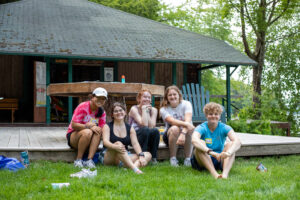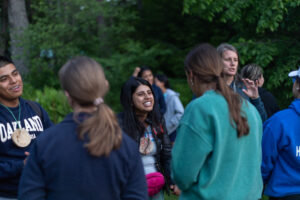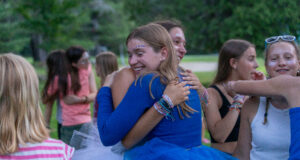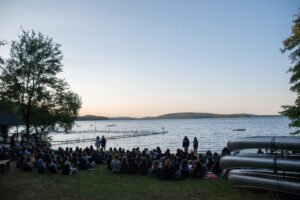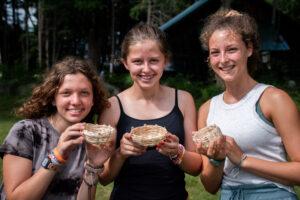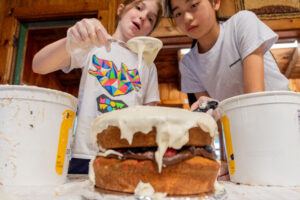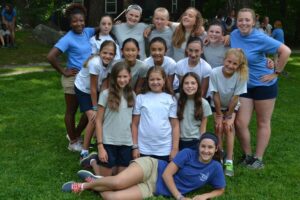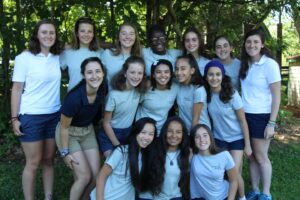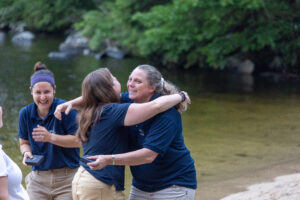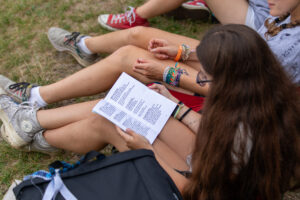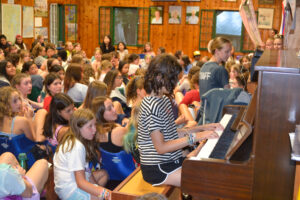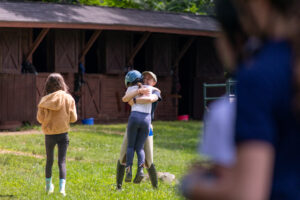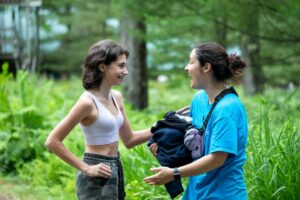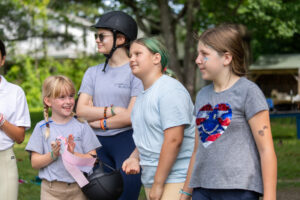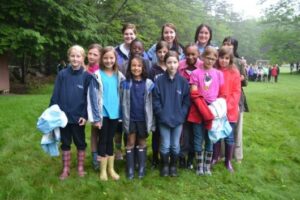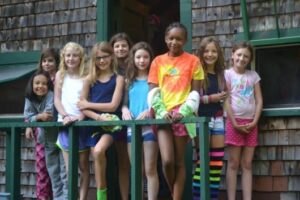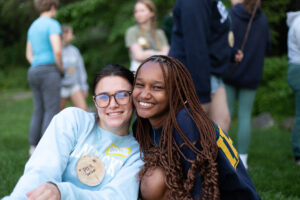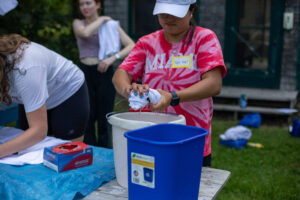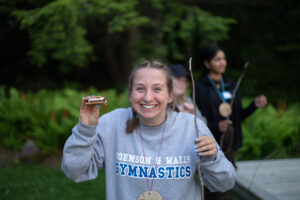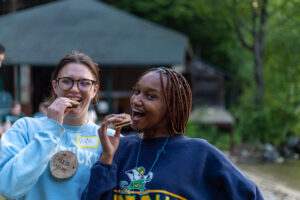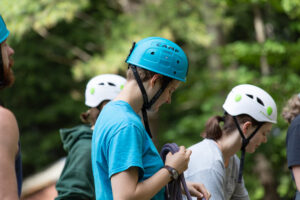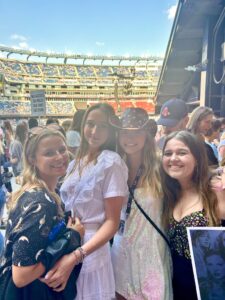This week, we are sharing a blog from Dr. Tracy Brenner, “The Camp Counselor,” psychologist and Maine Camp alumna camper/counselor as posted by Maine Camp Experience.
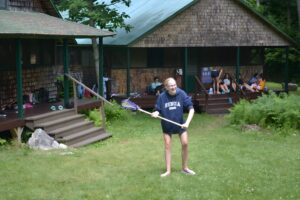
The summer is creeping closer and nerves may be on the rise. Camp prep has begun! Your inboxes are full of forms to fill out, including medical and vaccination history. But, just as important as those tetanus and measles shots are for the health of our children, so is the emotional vaccination you can give your child now so they will be better prepared to handle whatever emotions roll their way during the summer.
In my previous post I provided a four-step process for managing your own emotional reactions to those big feelings that emerge before, during and after the summer. (Remember: name your feelings, provide compassion, take a deep breath and give yourself a pep talk (click for a refresher). I also stressed the importance of regulating your own emotions in order to most effectively help your children with their own feelings. In today’s blog, I will provide tips and scripts so that you can help your child be ready to handle any emotions that come their way.
What is emotional vaccination?
Just as we use medicine to vaccinate our children to build physical antibodies, we use emotional vaccination to arm our children with emotional antibodies to prepare their minds and bodies to handle big feelings. The goal is not to prevent challenging feelings but to prepare our children to experience and tolerate a full range of emotions.
My kid doesn’t seem nervous; why “vaccinate?”
Sometimes parents are hesitant to initiate conversations about potential challenges if their child is not actually expressing them spontaneously. For example, a parent might say, “he’s not talking about being homesick, I don’t want to make him worried if he’s not.” Well, that’s not how feelings work. It’s possible that your child might become emotional during this conversation in a way you haven’t seen yet, but this is actually a good thing. Once they share their feelings, you have the chance to help your child cope. While it may have taken your prompt to spark emotion, it doesn’t mean the feelings weren’t always there or that they wouldn’t come at camp. In other words, you are not responsible for creating those feelings, just because you introduced the topic. If homesickness isn’t a problem for your child, then it’s not a problem for your child. Avoiding exploring a feeling doesn’t prevent the feeling from happening or cover up its existence.
How do we emotionally vaccinate our kids?
Great news: there’s no shot – just a boost of resilience. Emotional vaccination happens when parents (who remain calm) engage with their children to talk through, anticipate and plan for any feelings that might arise. My preference is to start the process of vaccination in a calm moment, not at bedtime and not in the heat of a meltdown. Just as you are advised not to receive a Covid vaccine when you have an active case of Covid, you cannot strengthen your emotional immune system when it is already flooded with feelings. The car can be a great place to spark discussion: You have a captive audience; a contained space; and sometimes it’s easier to explore feelings without the intensity of eye contact.
Lines for starting the conversation:
If your child has never mentioned any concerns about camp say:
“I know that you are super excited about camp, I’m so excited for you too! We haven’t yet talked about any fears or worries you might have about the summer. What are some things on your mind?”
Or
If your child (like mine) has been very vocal about his concerns, start like this:
“I know you’ve mentioned being nervous about missing home this summer, let’s talk more about it.”
Or (for a returning camper)
“I know there were some parts of camp last summer that were challenging. Let’s talk more about what that felt like”
Whatever your child identifies as their worry, respond with the favorite three little words of a psychologist: “tell me more.” Remain open and help your child expand and explore all of his or her thoughts and feelings. Resist the urge to fix!
Dos and Don’ts
Do: Provide empathy, support and validation. Say things like: “I hear what you’re saying.” “I get it.” “I remember feeling that way too when I was your age.” “Doing something new is hard.” “Transitions are hard.” “Leaving home for the first time feels scary.”
Don’t: Ignore the emotion by going straight to problem solving. Avoid lines like: “oh you’re nervous about having friends in your bunk, I’ll just call the director and make sure you’re with your best friend.”
Do: Let your child know that you believe in him or her: “It’s okay to miss me. You can do hard things. I believe in you.”
Don’t: Offer rescue, like: “if it’s miserable you can come home.” The decision for a child to leave camp early is a rare occurrence and should be made with a team approach, including the camp director’s involvement.
Don’t: get entangled in a discussion of whether or not your child is going to camp.
Instead: Say something like:
“I totally get that this is sparking really big feelings. This conversation isn’t about whether or not you’re going to camp, it’s about learning to anticipate and handle uncomfortable, big feelings. So for this conversation, can we take the decision off the table?”
Go deeper
Wonder with your child what, when, and where these feelings might occur, what it might feel like in their body, and how they might express their emotion. This is really the work of vaccination: You prepare your child in advance for the feelings, so that when they are in the situation, their minds and bodies are better prepared to handle it.
Say: “I hear you’re worried about missing us. Tell me more.” “When do you think that feeling might hit you most?” (If your child doesn’t offer ideas, suggest that night time, early morning or other “downtimes” are usually more common times when we miss home rather than when we are busy in a soccer game.) Ask: “When you’re sad, what might your body feel like and what might your body do?’
Create a coping tool kit
Introduce some coping skills that your child can practice now and use at camp. In my consultations with kids and parents, we make an actual “emotional toolbox” filled with strategies or quotes. Teach the “Notice/Name, Compassion, Deep Breath, Pep Talk” strategy I suggested parents use in my last blog. Here are a few more examples of what can be in a tool kit:
- Slips of paper with lines like: “this feels hard because it is hard” / “it’s okay to feel sad and miss my parents, I’m away from home, of course I miss them.” / “take a deep breath.”
- Reminders of context cues: “downtime is harder than active time.”
- A support system flow chart: list all of the supportive people at camp they can go to for help, a hug, etc.
- Distraction techniques (because sometimes we just need to get out of our heads). List things like: reading a book, listening to music, playing with friends, throw yourself into an activity.
Parents, try using emotional vaccination in the months ahead. Feel free to reach out for further consultation or questions.
drtracybrenner@gmail.com and www.drtracybrenner.com and @drtracybrenner on instagram
Dr. Tracy Brenner continues to partner with Maine Camp Experience and share her expertise through their website.
